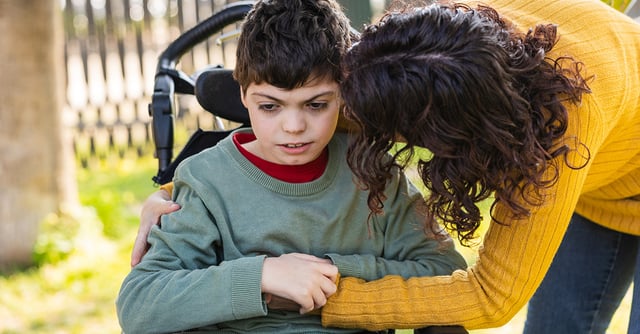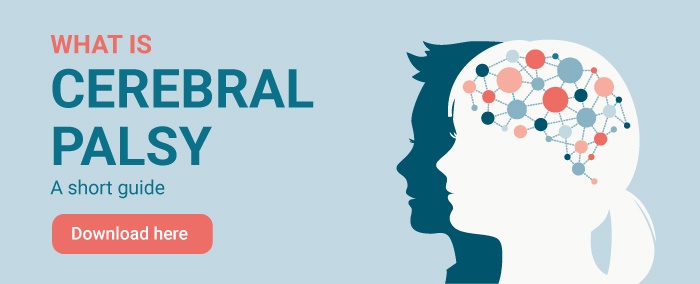
27-Aug-2025Cerebral Palsy and Mental Health

Back to Blog Overview
Living with cerebral palsy (CP) isn’t only about mobility – it’s also about mental wellbeing. Around 1.6 in every 1,000 births are affected with CP, and with improved care, people live longer, fuller lives. Yet research shows mental health often gets overlooked, despite being just as vital as physical health.
In this article you can learn more about:
- Looking after mental health
- Common symptoms of mental health issues
- Young people with CP are especially vulnerable
- Treatment options for mental health
- The Importance of seeking help early
Looking after mental health
If you or someone you care for have cerebral palsy (CP), you probably already know how much energy it takes to manage the physical side of things. But mental health matters just as much—and the two are deeply connected. Living with a long-term condition can increase the risk of anxiety or depression, and when these go untreated, they can also make physical health harder to manage.
Mental health struggles can affect sleep, appetite, energy, and focus. They can leave you feeling demotivated, less likely to keep up healthy habits, or even less inclined to see friends or take care of yourself. Over time, this can make any existing health challenges feel worse.
On top of this, everyday barriers—like difficulties with transport or accessibility—can add extra stress. Missing out on social opportunities or not being able to reach work, services, or appointments can increase feelings of isolation, which in turn affects mental wellbeing.
Unfortunately, it’s not uncommon for doctors, carers, or even people with CP themselves to overlook mental health, or to assume every symptom must be related to CP. But research shows that people with disabilities or long-term health conditions are three to four times more likely to develop depression or anxiety. And this isn’t about how “severe” your CP is—it’s more about stress levels, pain, fatigue, coping strategies, and the support you have around you.
That’s why mental health should always be part of regular health check-ups. Spotting the signs early makes a huge difference. If you or someone close to you notices changes in mood, sleep, motivation, or social interaction, it’s worth speaking up. Early support can stop small struggles from turning into longer-term mental health problems.
Generally speaking, if you have CP, your mental health is just as important as your physical health. Looking after both together gives you the best chance to live well.
Common symptoms of mental health issues
The symptoms of mental health issues in people with cerebral palsy (CP) are very similar to those seen in the wider population, but sometimes they can be misattributed to CP itself. For example, fatigue being seen as “just part of CP” rather than a sign of depression.
Here are some common signs to look out for:
Emotional signs
- Ongoing feelings of sadness or low mood
- Irritability, frustration, or frequent mood swings
- Withdrawing from friends, family, or hobbies
- Feeling hopeless, guilty, or worthless
Cognitive and behavioural signs
- Trouble focusing or making decisions
- Loss of interest or motivation in daily routines
- Negative or self-critical thinking
- Struggling with planning or staying organised
Physical changes
- Disturbed sleep (too little or too much)
- Changes in appetite
- Constant tiredness or reduced energy
- Pain feeling worse or harder to manage
Social and daily life changes
- Avoiding social contact and becoming isolated
- Skipping school, work, or therapy sessions
- Relying more on others for self-care
- Finding it difficult to maintain relationships
Young people with CP are especially vulnerable
The transition from adolescence to adulthood can be stressful for anyone. For young people with cerebral palsy (CP), this stage often brings extra hurdles—transitioning to adult healthcare, pursuing further education or training, finding work, living more independently, and building adult social and romantic relationships. It’s also the time when many first experience anxiety or depression.
Motor difficulties and related physical, cognitive, or health complications can make these challenges feel heavier, increasing the strain on mental wellbeing. Research shows that young adults with CP often have lower rates of employment or further education, participate less in social activities, and rely more on their families for support.
During this period, regular follow-up from family members and health professionals is vital to ensure that mental health challenges are recognised early and the right support is provided.
Treatment option for mental health
Treatment is often very much the same as it is for the general population, but some adaptation to suit communications, mobility or accessibility may be need.
Talking therapies
One of the most common and effective options is talking therapy. This can include cognitive behavioural therapy (CBT), counselling, or psychotherapy. Young people and families may also benefit from family therapy.
Medication
Sometimes medication is recommended alongside therapy. Antidepressants or anti-anxiety medicines can help ease symptoms, but your doctor will carefully check for interactions with any medication you already take for CP, such as for spasticity or seizures.
Lifestyle and self-management
Day-to-day strategies can also make a real difference. Managing pain, fatigue, and sleep problems often improves mood and wellbeing. Staying active through adapted exercise, physiotherapy, or gentle activity can boost energy levels. Just as importantly, staying socially connected helps reduce feelings of isolation.
Support and adjustments
Beyond medical treatments, support services play a key role. Peer support groups can connect you with others who understand what it’s like to live with CP. Therapists should also offer accessible information and communication support, whether that’s Easy Read materials or the use of AAC devices. And in education or work, reasonable adjustments under the Equality Act can reduce stress and support your wellbeing.
The Importance of seeking help early
When mental health problems first appear, it can feel tempting to wait and hope they pass on their own. But with cerebral palsy, untreated stress, anxiety, or depression can quickly affect both emotional and physical health. Reaching out early—to your GP or another health professional, or a trusted friend or family member—makes a real difference.
Getting support at the right time can prevent small challenges from becoming bigger ones. It can also help you find practical strategies for coping with pain, fatigue, or social barriers, all of which can impact wellbeing. Remember: asking for help is not a weakness, but an important step towards living well with CP.

Rikke Damkjær Moen brings many years of experience as clinical physiotherapist to the Made for Movement team. Her mission is to ensure that everybody, regardless of mobility problems, should be able to experience the joy and health benefits of physical activity. As our Medical Manager, Rikke is passionate about sharing knowledge so that individuals with special needs, families, and clinicians can discover the possibilities and solutions provided by Made for Movement.


